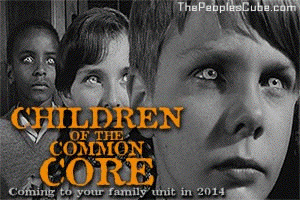 If you have kids in school or you teach schoolchildren, you must remember those halcyon days of 2008, when the idea of a Common Core (CC) to direct and track all American children along educational pathways to careers or college began to take root.
If you have kids in school or you teach schoolchildren, you must remember those halcyon days of 2008, when the idea of a Common Core (CC) to direct and track all American children along educational pathways to careers or college began to take root.
You remember when testing consultant David Coleman and the executive director of the Council of Chief State School Officers (CCSSO), Gene Wilhoit, visited Microsoft mogul Bill Gates in Seattle to persuade him to generously supplement future governmental funding of Common Core. And did Gates’ foundation ever deliver! It provided grants to write, implement, and finally propagandize CC totaling $384,605,464 as of June 2016.
You also likely remember when later in 2008, a Gates-aided triumvirate consisting of the National Governors Association, CCSSO, and a big-business-led outfit called Achieve started plugging for federal backing for Common Core, which the Obama administration subsequently was thrilled to pledge as part of a “federal-state partnership.”
And you must remember those exciting times in the summer of 2009, when the special interest group’s threesome assembled 60 people to serve on teams to write the Common Core English and math standards or to offer advice. (There were five lead writers, including Coleman for English and his partner in a test-consultancy business, Jason Zimba, for math. Coleman is now president of the College Board, where he has aligned the college-prep test, the SAT, with Common Core.)
Surely you recall those robust debates in state legislatures and local school boards culminating in the adoption of Common Core by 46 states and the District of Columbia — and all the thoughtful media coverage of the pros and cons of embracing one 640-page set of instructional standards for all schoolchildren.
This narrative — a fine one at that — is what many on the left would like you to believe, but it’s simply not true. You, like the vast majority of parents, were likely not aware of the handiwork of these high-rollers until years later, when your children started bringing home the fuzziest math ever as homework while reading a lot less imagination-tickling children’s literature — all of which is in keeping with the universal K–12 Game Plan your school board never approved. As a teacher, you didn’t know how your methods and lesson plans would radically change until your supervisors started handing you your script and marching orders for education converted to workforce prep, which were crafted according to government specs.
And this was no mistake. The triumvirate placed only one K–12 teacher on those CC developmental panels. The national standards passed through just four state legislatures. Appointed state boards of education rubberstamped most of the applications in desperate bids to get a slice of the $4.6 billion in Obama stimulus funds promised to those who agreed to adopt the standards. There was virtually no debate, state or local.
Everyday parents picked up few clues from reading newspapers, because not until 2013 did education writers awaken from their slumbers and start writing Common Core stories. And that tardy coverage mostly blamed the Tea Party for stirring dissent. Yes, wall-eyed, sleepy, or biased reporters disregarded all the serious criticism of CC coming from early childhood experts, English and math scholars, and well-known progressive educators.
Commenting on one aspect of this regimen imposed on education from the top down — logic-defying “standards-based grading” — Joy Pullmann wrote, “The people most affected — school staff, parents, local leaders — are not being allowed to decide what works best for their students and their children, and that lack of choice inflames the political and academic disagreement over Common Core.
“The central planners making those decisions are so far away from classrooms they may forget they’re playing with human beings,” Pullmann wrote. “It’s a little like kids bulldozing and rebuilding houses in a video game, except it isn’t a game. It’s real.”
That observation is from Pullmann’s just-released book The Education Invasion: How Common Core Fights Parents for Control of American Kids, and it is the real deal. Meticulously footnoted, this book by the managing editor of The Federalist (and colleague of mine at the Heartland Institute) tells the story of Common Core’s genesis within the education-industrial complex and the occasional successes of grassroots opponents in denting the juggernaut. And it delves into the mounting evidence that this monolithic scheme is a miserable flop.
Is Common Core dead or moribund? Not really. Yes, it is encouraging that more than half the states are snubbing the CC-aligned assessments developed by two federally funded consortia. However, Education Week, the education establishment’s paper of record, reports 37 states are sticking to their CC adoptions, while nine others have announced “major” rewrites or replacements. Alas, though, all nine appear to be repackaged or rebranded versions of Common Core — Common Core lite or Common Core by another name, not genuine repeal.
Given all the foundation and tax money sunk into curricular materials, technology, and teacher retraining to support this de facto national curriculum, it is unlikely the establishment elites are going to give up on Common Core anytime soon. Nor is it likely political Washington, DC will come to the rescue, despite President Donald Trump’s repeated calls for ending CC.
Is it time to despair of “consent of the governed” ever being a guiding principle again? Is it time for parents and neighbors just to accept perpetual victimhood? Pullmann thinks definitely not. It is time to fight back harder than ever.
“We can pick up our pens and keyboards to demand political redress and promote cultural remedies,” Pullmann wrote. “We can refuse to let our kids take tests that perpetuate a failed system of education. We can show up at public meetings to voice our dissent for the record, and to support and inform our neighbors. We can even create better schools than those our government provides.”
Indeed, the one positive outcome of the Common Core power grab is that it has inspired many citizens to do just that: create or discover their own schools. Homeschooling is booming more than ever. Private school choice programs doubled between 2009 and 2016. Education savings accounts enabling parents to exercise a variety of options to customize their kids’ learning experiences are catching on as perhaps the big post-voucher innovation.
In the land of the free, surely choice eventually will triumph over the dreary imposed sameness of a Common Core.
Written by Robert Holland and published by Americamn Thinker ~ May 12, 2017.
 FAIR USE NOTICE: This site contains copyrighted material the use of which has not always been specifically authorized by the copyright owner. We are making such material available in our efforts to advance understanding of environmental, political, human rights, economic, democracy, scientific, and social justice issues, etc. We believe this constitutes a ‘fair use’ of any such copyrighted material as provided for in section 107 of the US Copyright Law. In accordance with Title 17 U. S. C. Section 107, the material on this site is distributed without profit to those who have expressed a prior interest in receiving the included information for research and educational purposes. For more information go to: http://www.law.cornell.edu/uscode/17/107.shtml
FAIR USE NOTICE: This site contains copyrighted material the use of which has not always been specifically authorized by the copyright owner. We are making such material available in our efforts to advance understanding of environmental, political, human rights, economic, democracy, scientific, and social justice issues, etc. We believe this constitutes a ‘fair use’ of any such copyrighted material as provided for in section 107 of the US Copyright Law. In accordance with Title 17 U. S. C. Section 107, the material on this site is distributed without profit to those who have expressed a prior interest in receiving the included information for research and educational purposes. For more information go to: http://www.law.cornell.edu/uscode/17/107.shtml
